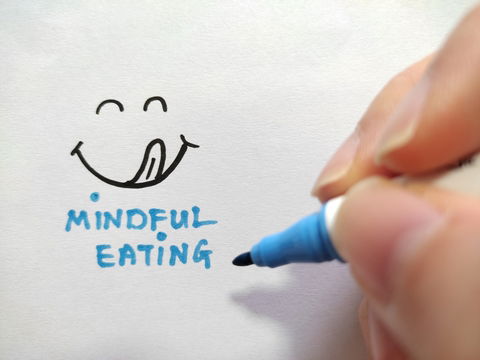Mindful Eating Requires Listening to Hunger Cues

Since humans often confuse hunger for thirst, your appetite can have a field day suggesting all sorts of solutions involving poor food choices. Drinking a glass of water and waiting ten minutes can often curb faulty signals. One of the major problems with losing weight quickly is that your body may respond negatively and excess hunger most often puts an extra-tempting spin on your appetite. So, not consuming enough food can topple your weight loss efforts.
When you launch a weight loss journey, it is easy for your previous eating habits to become scrambled by new patterns in direct conflict to established eating habits. If you stop grazing during the day, an increase in appetite can occur. Smart food choices are essential for anyone’s dietary plan when embarking on a weight loss journey. Generally speaking, food that are filled with lots of water and fiber are most often lower in calories but are better at satisfying hunger as well as your appetite.
Mindful eating is the practice of listening to internal hunger cues and avoiding distractions during the eating process. Savor the taste of food and try these proven tips that promote healthier eating habits:
- Eat Regular Meals – Experts say ghrelin hormone rises around the time your body is expecting you to eat. Eating regular meals packed with balanced nutrients can stabilize hormone production and release. Healthy snacks during the day can help you manage emotional cravings.
- Stay Well Hydrated – Drinking water not only helps you burn calories by keeping your metabolism working and quenching your thirst may eliminate unexpected feelings of hunger.
- Pick Healthy Snacks – Snacking is a must when you’re trying to shed pounds and keep them off. A healthy snack with hunger-fighting ingredients can get you from one meal to the next without a grumbling stomach.
- Be a Smart Shopper – A key to ensuring that you continue to eat right is to become a smarter shopper at the grocery store. Avoid impulses and temptations by sticking to a prepared grocery list.
- Stop Eating When Full – Your brain is programmed to eat, drink and be merry. As you eat less to lose weight, it sabotages your plans for starvation by signaling your appetite that you must be hungry, so you must learn how to stop eating when you’re full.
Unless you drink plenty of water and optimize your meals by adding protein and fiber, you are likely going to find yourself in a losing battle with your appetite. Even when you are not really hunger, your appetite can cause you to crave more food. The hard truth is that many attempts to lose weight and keep it off will fail. This doesn’t mean you are a failure. To find what works for you takes determination and commitment to understanding the countless ways that didn’t work.
A great place to start your new journey is to start cooking lots of whole foods and workout a bit more regularly. Both will boost weight control by satisfying your hunger while managing your appetite for real food. The support systems you relied on during weight loss can be very important to long-term weight control. For an added boost, contact the Metabolic Research Center, we’ve been helping people keep weight off for over three decades.
By submitting this form, you agree to receive marketing text messages from us at the number provided, including messages sent by autodialer. Consent is not a condition of any purchase. Message and data rates may apply. Message frequency varies. Reply HELP for help or STOP to cancel. View our Privacy Policy and Terms of Service.

